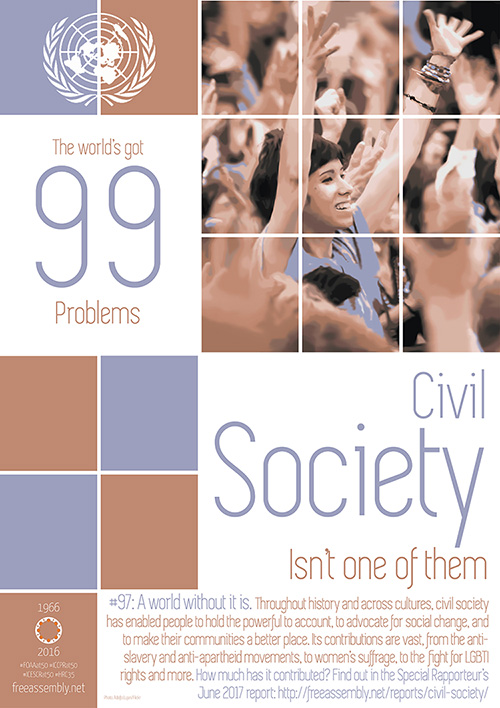These words echo those of the former Special Rapporteur on freedom of assembly and association, Maina Kiai, in his final report, which focused on the achievements of civil society.
In the statement supported by organisations from Human Rights Houses from Armenia, Belarus, Georgia, Norway, Poland, Serbia, and Ukraine, HRHF highlighted a range of examples of States acting to limit and silence their own civil societies.
It was given as part of a formal interactive dialogue with Maina Kiai’s successor, Annalisa Ciampi, at which she presented her predecessor’s report, and elaborated on her ideas for the mandate and what she would likely focus on in the future. She committed the mandate itself to “deepening ties” with civil society.
HRHF’s Head of Advocacy, Florian Irminger, reflects on freedom of assembly and association rights, the role of civil society, and on working with the new Special Rapporteur, Annalisa Ciampi.
Almost all States that spoke during the interactive dialogue suggested that civil society was important, but only some urged a focus on protecting core rights associated with a flourishing civil society, including freedom of assembly and association. Echoed by Belgium, France, Latvia, Lithuania, and Spain, Estonia expressed concern over the global “trend of narrowing space for civil society.” Sweden insisted that “threats” to civic freedoms now exist in around 100 countries.
Other states sought to focus on the importance of civil society “obeying the law,” and the importance of placing certain restrictions on civil society and its work. China urged civil society and NGOs to “obey the constitution and the law,” as did Nigeria, while Egypt said that civil society should not become “politicised.” The Russian Federation underlined that it expected something else than only criticism “found from abroad”; the authorities instead expect “an attitude of constructive cooperation with authorities in order to solve existing problems.”
Ireland underlined that “more needs to be done to recognise civil society as having an equal stake in discussion in multilateral fora,” such as the United Nations.
These statements reflect well the trend of shrinking space for civil society, which is not just present at the Council, but increasingly evident in the countries that spoke in favour of a more restrictive interpretation of the enjoyment of association and assembly rights.
Such sentiments were also at the core of HRHF’s intervention, as it highlighted five key, troubling issues faced by civil society:
- States raising cultural norms above human rights law
- States placing limitations on civil society through an “authorisation based system”
- The general limiting of core rights associated with civil society
- Limitations placed on the foreign funding of NGOs
- The weakening of independent NGOs, while legitimising NGOs organised by governments and loyal to governments.
In response to States speaking about excessive restrictions to association and assembly rights, Annalisa Ciampi answered that the main source of shrinking space for civil society is States: “You are asking me what measures should be taken; I am reverting the question to you and telling you: Stop taking such measures that restrict space.”
HRHF concluded its UN statement in recognition of the challenges ahead, and in expressing attentiveness to how the new Special Rapporteur will assess and address these issues in years to come.
HRHF statement on freedom of association and assembly to the 35th session of the UN Human Rights Council.
Documents:
-
- Need to support civil society
In the statement to the UN Human Rights Council, supported by organisations from Human Rights Houses from Armenia, Belarus, Georgia, Norway, Poland, Serbia, and Ukraine, HRHF alerted the Council about State policies which aim to limit and silence their own civil societies.
- Need to support civil society
More on freedom of assembly and association
-
-
- FOAA Online: Easily accessible legal arguments on assembly and association rights
- Maina Kiai reports on fundamentalism in final appearance at HRC
- UN clearly stands behind right to protest and to promote human rights
- HRC 31: HRHN Statement on Peaceful Protest
- UNGA Debate: Enabling active participation in society
- HRHF calls for civil society space during electoral processes
- Report of the Special Rapporteur on the rights to freedom of peaceful assembly and of association
-
HRHF engagement on freedom of association and assembly
Against the background of a global decline in freedoms, HRHF has over the last few years closely cooperated with the Special Rapporteur’s mandate. Among other initiatives, we have witnessed the utility in the mandate holder engaging in regular regional, thematic and strategic consultations, so as to remain apprised of the latest developments, and to encourage deeper thinking on the range of issues connected to the mandate’s human rights focus.
Newly appointed Special Rapporteur on association and assembly
UN Special Rapporteur Annalisa Ciampi took up her mandate on 1 May 2017 for an initial period of three years, during which she is to report to the Human Rights Council in June and to the United Nations General Assembly in October.
On 7 June, Annalisa Ciampi held a first consultation with civil society in Geneva, at which HRHF and many other organisations participated, including the Lawyers’ Committee for Human Rights (YUCOM), member NGO of the Human Rights House Belgrade.
HRHF developed its vision of work with the mandate in a congratulation letter sent on 24 April 2017.





